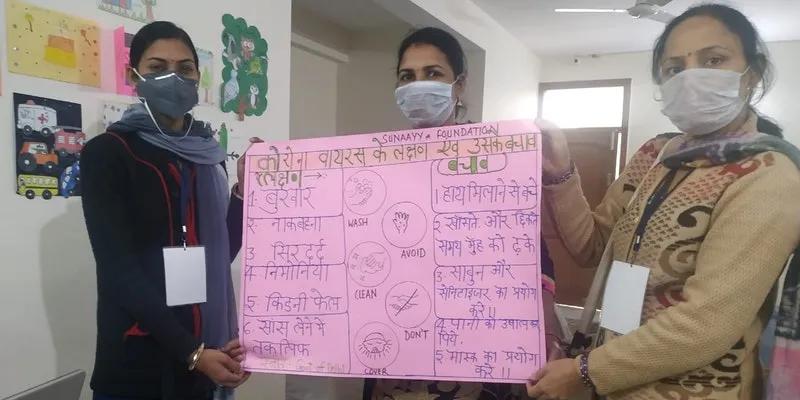With a focus on education, this NGO has changed the lives of 10,000 underprivileged women and children
Richa Prashant founded Sunaayy Foundation in 2009 to educate underprivileged children, and provide job opportunities and skill-building courses for women .
The right to education is a fundamental right, but thousands of children across India remain deprived of it.
According to All India Education Survey, less than half of India's children between the age of six and 14 go to school. India’s literacy rate is currently 69.3 percent, and according to the 2011 Census, India’s eastern region had the lowest literacy rate of 59.6 percent.
These hard realities and skewed figures drove Richa Prashant to do something to change status quo. Educated in an English-medium convent school, married to the man of her dreams, and having faced no real issues, Richa considers herself a privileged Indian woman.
It was to help others who were not so lucky that she founded Delhi-based NGO Sunaayy Foundation in 2009.
Sunaayy, which stems from the word Suneeti, is an initiative of like-minded individuals keen to empower underprivileged, uneducated children and women to live meaningful and self-reliant lives.

Richa Prashant, the Founder of NGO Sunaayy Foundation, is seen with children.
The Sunaayy Foundation
Richa's main aim with the Sunaayy Foundation is to educate underprivileged children, and provide job opportunities and skill-building courses for women to help build their communities. Richa feels that the uplift of women and children goes hand in hand.
“If you cannot influence or encourage women, their children will not study,” Richa says. “Hence, we primarily focus on women.”

The Sunaayy Foundation is helping educate underprivileged children.
The NGO caters to children in the age group of three to 14 years. Over the last 11 years, Sunaayy has managed to make an impact on more than 10,000 lives.
The big hearts of Sunaayy
According to Richa, the Sunaayy Foundation is successful because of its volunteers. The foundation is a 99 percent volunteer-run organisation. The volunteers comprise people from different age groups and backgrounds, who contribute in their own way.
“Even though I am the face of it, the organisation is successful today only because of volunteers who have extended help.”
With the support of these donors and volunteers, the NGO is able to provide children with two meals, a snack, and uniforms, which saves about Rs 9,000 for a family that makes an income of about Rs 5,000 a month.
Children who migrate from their learning centre to receive formal education can be sponsored. The sponsorship is not just in terms of money, but also as mentors.
The teaching staff
Sunaayy Foundation is staffed with a few volunteers, primarily women who could not complete their formal education. These women are trained by the NGO in various subjects, which ensures them a day job. An increasing number of women has joined the foundation over the years.
“These women are more enthusiastic about working as teachers,” Richa explains. “We also encourage them to save their money, especially because they deal with issues like domestic violence on a regular basis.”

The teachers of Sunaayy use posters to create awareness about coronavirus.
Ranu Mishra, one of the teachers working for about seven years at Sunaayy, says:
“Every Saturday, we visit our students’ homes. When they tell their parents that their teacher has come, I feel very proud. For this and all the support that I receive, I am ever grateful to Sunaayy.”
In a Sunaayy classroom
From the time it was founded, the organisation has followed a makeshift structure. It doesn't believe that learning only happens within four walls.
“The children that we cater to are those of migrant labourers who’ve come from different states to the bigger cities to find a livelihood,” Richa says. “While parents struggle to make ends meet, the children are left to be fending for themselves."
"So, irrespective of whether education is free, the child can never access it because of the situation.”

The Sunaayy Foundation conducts classes in a makeshift setup.
While many schools face the issue of students attending classes only for the mid-day meal, the Sunaayy Foundation has a bunch of enthusiastic children coming in. They are taught basic lessons, moral values, co-curricular activities like arts and crafts, and English phonetic lessons.
“They are very curious to learn the English language. At our centre in Bihar, the children are very fascinated by teachers speaking in English, and show great interest in the language.”
Once they complete their sessions at Sunaayy, they receive their formal education in schools like Delhi Public School and GD Goenka Public School, thanks to the government’s quota for the economically weaker sections (EWS).
The road ahead
The foundation already has a closed-wall programme running in Kolkata. The programme is similar to the one being run in Delhi. If it gets a few more volunteers, Sunaayy might expand to other cities or at least spread the idea to other places.
“Through our concept of volunteering, we would love to do more in society’s interest,” Richa says. “We are strongly motivated to make the world a better place with education.”
(Edited by Javed Gaihlot)






